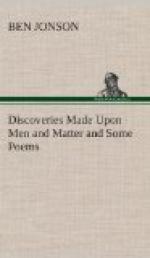Aristophanes.—Plautus.—Of which Aristophanes affords an ample harvest, having not only outgone Plautus or any other in that kind, but expressed all the moods and figures of what is ridiculous oddly. In short, as vinegar is not accounted good until the wine be corrupted, so jests that are true and natural seldom raise laughter with the beast the multitude. They love nothing that is right and proper. The farther it runs from reason or possibility with them the better it is.
Socrates.—Theatrical wit.—What could have made them laugh, like to see Socrates presented, that example of all good life, honesty, and virtue, to have him hoisted up with a pulley, and there play the philosopher in a basket; measure how many foot a flea could skip geometrically, by a just scale, and edify the people from the engine. This was theatrical wit, right stage jesting, and relishing a playhouse, invented for scorn and laughter; whereas, if it had savoured of equity, truth, perspicuity, and candour, to have tasten a wise or a learned palate,—spit it out presently! this is bitter and profitable: this instructs and would inform us: what need we know any thing, that are nobly born, more than a horse-race, or a hunting-match, our day to break with citizens, and such innate mysteries?
The cart.—This is truly leaping from the stage to the tumbril again, reducing all wit to the original dung-cart.
Of the magnitude and compass of any fable, epic or dramatic.
What the measure of a fable is.—The fable or plot of a poem defined.—The epic fable, differing from the dramatic.—To the resolving of this question we must first agree in the definition of the fable. The fable is called the imitation of one entire and perfect action, whose parts are so joined and knit together, as nothing in the structure can be changed, or taken away, without impairing or troubling the whole, of which there is a proportionable magnitude in the members. As for example: if a man would build a house, he would first appoint a place to build it in, which he would define within certain bounds; so in the constitution of a poem, the action is aimed at by the poet, which answers place in a building, and that action hath his largeness, compass, and proportion. But as a court or king’s palace requires other dimensions than a private house, so the epic asks a magnitude from other poems, since what is place in the one is action in the other; the difference is an space. So that by this definition we conclude the fable to be the imitation of one perfect and entire action, as one perfect and entire place is required to a building. By perfect, we understand that to which nothing is wanting, as place to the building that is raised, and action to the fable that is formed. It is perfect, perhaps not for a court or king’s palace, which requires a greater ground, but for the structure he would raise; so the space of the action may not prove large enough for the epic fable, yet be perfect for the dramatic, and whole.




